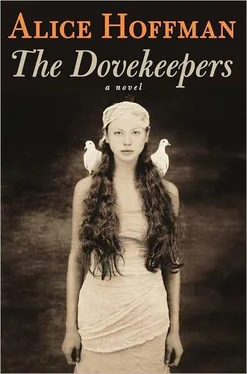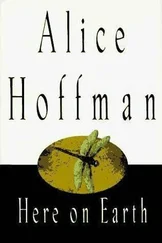Alice Hoffman - The Dovekeepers
Здесь есть возможность читать онлайн «Alice Hoffman - The Dovekeepers» весь текст электронной книги совершенно бесплатно (целиком полную версию без сокращений). В некоторых случаях можно слушать аудио, скачать через торрент в формате fb2 и присутствует краткое содержание. Год выпуска: 2011, ISBN: 2011, Жанр: Историческая проза, на английском языке. Описание произведения, (предисловие) а так же отзывы посетителей доступны на портале библиотеки ЛибКат.
- Название:The Dovekeepers
- Автор:
- Жанр:
- Год:2011
- ISBN:978-1-4516-1749-8
- Рейтинг книги:2.5 / 5. Голосов: 2
-
Избранное:Добавить в избранное
- Отзывы:
-
Ваша оценка:
- 60
- 1
- 2
- 3
- 4
- 5
The Dovekeepers: краткое содержание, описание и аннотация
Предлагаем к чтению аннотацию, описание, краткое содержание или предисловие (зависит от того, что написал сам автор книги «The Dovekeepers»). Если вы не нашли необходимую информацию о книге — напишите в комментариях, мы постараемся отыскать её.
The Dovekeepers — читать онлайн бесплатно полную книгу (весь текст) целиком
Ниже представлен текст книги, разбитый по страницам. Система сохранения места последней прочитанной страницы, позволяет с удобством читать онлайн бесплатно книгу «The Dovekeepers», без необходимости каждый раз заново искать на чём Вы остановились. Поставьте закладку, и сможете в любой момент перейти на страницу, на которой закончили чтение.
Интервал:
Закладка:
When my time came and I bled, I used the torn hem of my tunic as a rag between my legs. There was nothing else. We were becoming savages, much like the barbarian tribes who lived in the desert and obeyed its brutal laws. Live if you can, or be left behind with the old and infirm, an offering to the creatures that prowl at night. I wound the blue scarf my brother had given me around my head, even though blue had been the color worn by the sister-brides we had found buried in the wilderness. All that we had was carried on our backs. All that we were was illuminated by the bright light of the Almighty. We lived because He allowed us to do so. Every breath belonged to our Lord, who had given us another day on earth.
NOW whenever I went to walk beside Sia she quickened her pace. The intimacy between us had been pierced to the bone. When we cooked together she didn’t speak. Sometimes she faltered when I was beside her. Once she became flustered and she burned her hand on the griddle set atop the fire. When we found a shallow pool at our next camp, I asked her to bathe with me. She declined, insisting she would bathe alone, but she never did. Instead she watched me reproachfully from behind the rocks, my young body an affront to her. I could hear her crying. I might have wept myself if I hadn’t lost the ability to do so, but I had decided long ago, in my father’s house in Jerusalem, I would never cry again. The goat soon became my only company. I found myself talking to her, until I recalled that was what witches were said to do. Then I only whispered, so no one would overhear.
WHEN AT LAST we found a place where we might stay for a while, with clutches of mint and a few yellow onions managing to grow in a gorge nearby, I searched out a cave that was higher on the cliff in order to seclude myself when my time came with the moon. A woman who bled was unclean, what was called niddah, and must remove herself from others for seven days. Even a single drop of blood that fell forced a woman to retreat from the world of men, until she had cleansed herself in a mikvah, water that was pure, running directly from God.
I went off by myself because it was our law, but there was another reason as well. I could no longer sleep in the same space as Sia. I had begun to imagine that she lay awake in the dark when her husband came to me, insistent now, as though claiming something he was owed. I wondered if she covered her ears, or worse, if she listened to us. I set myself apart to escape her prying eyes. In truth, I preferred my aloneness. I streaked my skin with mud to keep cool. I unplaited my hair. The stars were brighter on the ridge where I camped, they flecked the darkness to fill the night. I had seen women following the nomads, second and third wives who were banished to walk only with other women. They, too, covered themselves with mud. Though they should have walked in shame, they were even more beautiful than the first wives, for their skins had been turned white and yellow and red with mud, and their hair was loose, falling down their backs like water. They seemed oddly proud, for if there was nothing to quench the men’s thirst, then there was at least this available, their bodies, their souls.
We celebrated Rosh Chodesh, the rising of the new moon that marked the start of the month of Tishri. Blessed is He who spoke and the world came into being. Every month began as a reflection of the first words of the Torah, with new life, marked by the reappearance of the moon. By then we had been wandering nearly fifty days, avoiding any sign of Roman troops. On the Day of Atonement I found myself guilt-ridden, appalled to think God knew what I did at night, aware that I had stolen something that didn’t belong to me, as though I were a common thief, as well as the murderess my father had claimed me to be. My father and I had little to do with each other, though we were often confined in a small space and took our meals together. We turned our backs to one another. He had little choice but to eat the food I managed to set before him, though I’m sure he considered it to be unclean. I had heard him recite a prayer over his bowl, as men may do to chase away demons.
“Do you think I might kill you from the inside out?” I asked recklessly one noontime as he muttered over the greens I had prepared.
He shot me a filthy look. He was hunched over, frail, suddenly an old man. For the first time I saw him for who he was despite his cloak of invisibility. I knew he was broken. I realized then it was the prayer for the dead he had been murmuring, the words one is to say when a passing occurs: Blessed are You, Lord our God, King of the universe. Since the time of my birth he had been in mourning and he was mourning my mother still. All at once I was ashamed. He was my father, no matter how cruel, and I had not honored him.
We celebrated the glory of God on the Feast of the Tabernacles. The men prayed, but we had no grapes on the vine, no red pomegranates to split open so that the juice rained down our mouths and arms and this day differed little from any other day. Soon enough, the weather began to change. At last there were birds again. I hadn’t realized how silent the world was in the months of great heat until the flocks returned as they journeyed above us. This was the route they took so they might spend the winter in the south, where the nights were not so black and chill. The entire sky swelled with flocks of larks and scarlet rosefinch. There were buntings, turtledoves, brilliant Abyssinian rollers, glossy ibis. There were whole colonies of glorious yellow and turquoise bee-eaters, who called to each other, even in the night. A huge expanse of color drifted above us, all moving south, searching for grasslands. Sometimes they were like clouds along the horizon and other times they became the entire sky. To see the vibrant waves of birds in shades of red and blue above the white desert was a miracle. I no longer counted off the days with regret but rather with joy.
Even when I was unclean, when I had removed myself from the others, even though his wife might wake in the dark and find him gone, Ben Simon didn’t stay away. Men were supposed to avoid women during their time of the month, it was written in the Fourth Book of Moses, and so it was the law. But we broke every law it was possible to break in the desert, that was where cutting my leg had brought me, for it was the first rule I had ignored. I had no mother to call out cautions, but in truth, I would have disobeyed even if my mother had been alive to warn me. One broken law led to another. Ben Simon became unclean, covered with my blood the way he’d been covered with Roman blood when he struck his enemies in the courtyard of the Temple. He was used to committing crimes. His attitude was both tender and coarsely male. When he sank down beside me, his hand on the curve of my hip, his sex hard against me, I could see no guilt at all in his eyes. He said God could distinguish a sinner from a sin, and what we did was beyond judgment.
Whenever I came down from the cave, I could tell Sia knew where her husband went each time he vanished from her side. I knew by the uncomplaining way she went about her work, by her frown. I couldn’t meet my friend’s eyes. Everything I might have been had disappeared. The girl who walked to the oasis on the night the Temple burned no longer left footprints. She, who had ashes in her long, red hair and wept for the loss of her city and her home, had been left behind where the citron tree had grown. The key that had opened the gate into the wilderness had opened Sia to my betrayal.
I tasted grit between my teeth. I was a woman of the desert now, no longer the shy outsider, a city girl frightened of scorpions. I had become fierce, willing to do anything to get what I wanted. This was the way hunters were born. I felt that savagery inside of me, a dark glimmering of will that resolved to survive. If I wanted something, it became mine. I sneaked up on migrating birds and caught them in my scarf, sometimes in my bare hands. I was cunning, a lioness. I had watched how the black desert viper could hypnotize a bird, slowly wrapping itself around its prey before the final bite rendered it motionless.
Читать дальшеИнтервал:
Закладка:
Похожие книги на «The Dovekeepers»
Представляем Вашему вниманию похожие книги на «The Dovekeepers» списком для выбора. Мы отобрали схожую по названию и смыслу литературу в надежде предоставить читателям больше вариантов отыскать новые, интересные, ещё непрочитанные произведения.
Обсуждение, отзывы о книге «The Dovekeepers» и просто собственные мнения читателей. Оставьте ваши комментарии, напишите, что Вы думаете о произведении, его смысле или главных героях. Укажите что конкретно понравилось, а что нет, и почему Вы так считаете.












